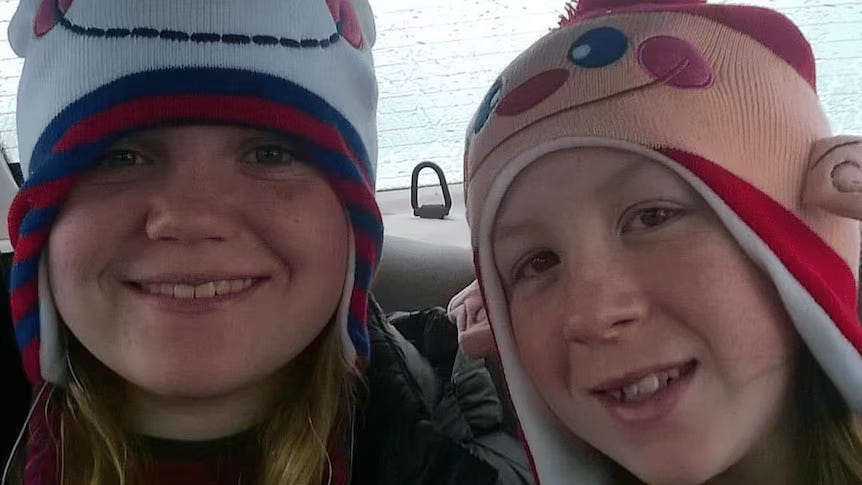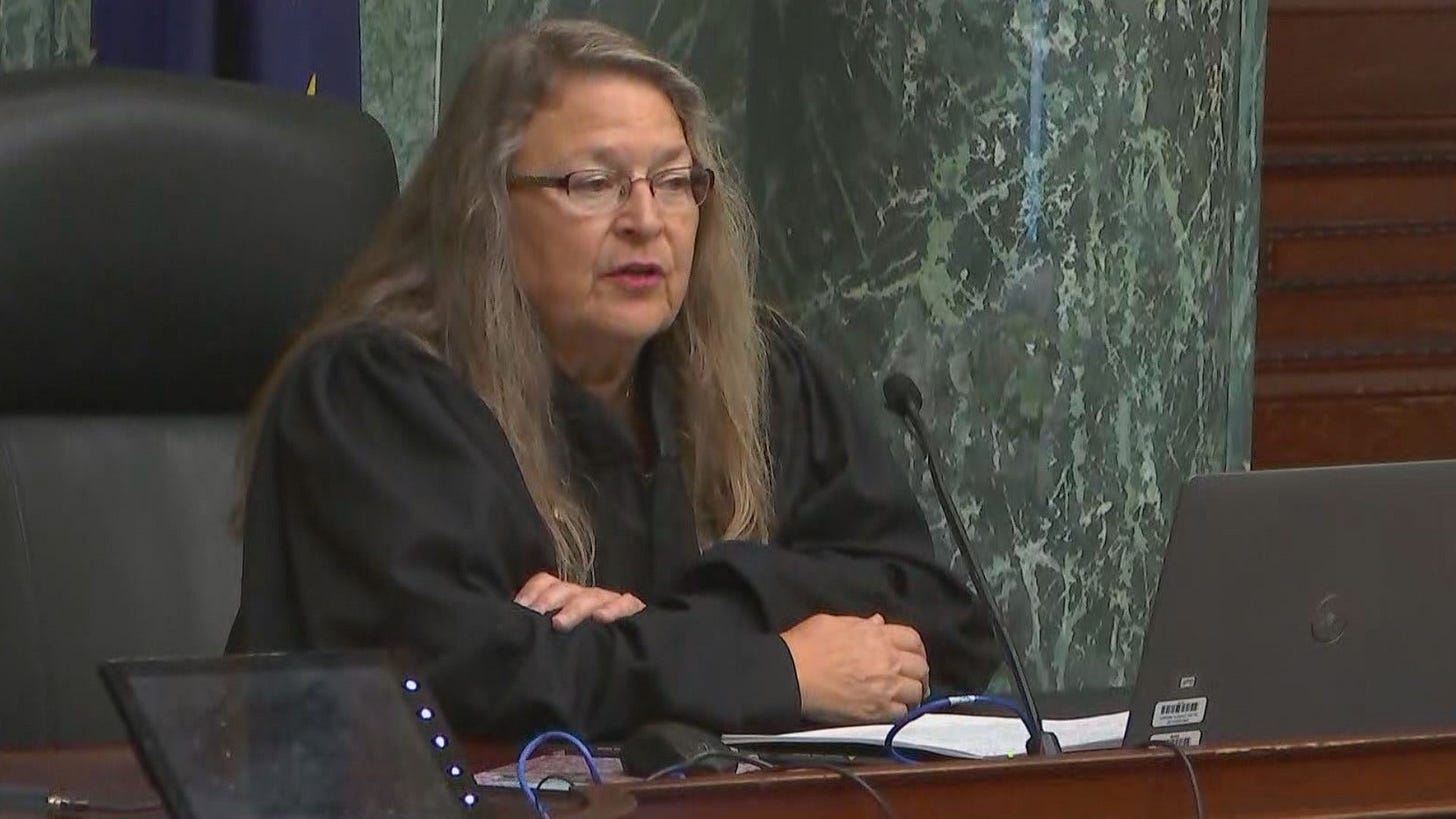The Delphi Murders: How Modern Technology Brought and Almost Derailed Justice
Libby German's ingenuity using a social media tool led to the arrest of the man convicted of her murder but creators using that same technology nearly derailed justice through misinformation
By Áine Cain, Kevin Greenlee, Alice LaCour, Brett Talley and Jayson Blair
Without the ingenuity and courage of 14-year-old Libby German, investigators still may not have solved the 2017 murders of her and her best friend, 13-year-old Abby Williams.
Libby's quick instinct to turn on her cell phone camera and record a menacing-looking man approaching her and Abby on an old, abandoned railroad bridge in Delphi, Ind., provided a damning piece of evidence against Richard Allen, the 50-year-old man convicted on November 11 for their kidnapping and murders.
The crime was initially dubbed the Snapchat Murders, and its resolution is a testament to the power of modern technology in solving crime.
But the same technology that allowed Libby to disseminate pictures of her abductor has broken down barriers to entry in publishing that have ushered in an era of reckless amateur investigations and conspiracy theories that have shaken public faith in the justice system.
In many ways, the criminal justice system interacts with the mainstream and new media as if they were stuck in a bygone era. There are few places that are more illustrative of the problem than Delphi, where, due to this new paradigm, many people believe Allen, a man who has confessed more than 60 times, is innocent.
Allen was convicted in what would have once seemed like a pretty open-and-shut case but not without the prosecution overcoming the headwinds of conspiracy theories, defense team leaks and judicial missteps that threatened to derail the case.
Gag orders and law enforcement approaches that once worked are failing due to the new media landscape. Without an adjustment by law enforcement, prosecutors, judges, and others who are involved, what’s happening in Delphi is a disease that could rapidly infect other Americans' perceptions and undermine faith in our justice system. .
If you don’t believe that what happens in true crime can significantly impact faith in the criminal justice system, you’d be wrong.

Eighty-four percent of the U.S. population above the age of 13 consume true crime through various mediums, including television, YouTube, social media or podcasting, according to a 2024 study by Edison Research, a surveying firm. The 230 million true crime consumers far outstrip the 115 million subscribers to The New York Times and The Washington Post and viewers that tune into prime-time news on cable and broadcast television.
Trust in the U.S. justice system has declined precipitously in the past decade. In a 2003 poll by Gallup, two-thirds of Americans said criminal suspects were treated at least somewhat fairly. That declined to half of Americans by 2023.
We have seen these problems increasingly, from the TikToker who made videos for her 110,000 followers that falsely accused a University of Idaho professor of being responsible for the 2022 murders of four students there to the amateur yellow “journalist” in Massachusetts who weaved an absurd tale of a conspiracy involving upwards of 30 people that likely contributed to a hung jury in the trial of a woman for the murder of a police officer.
But Delphi is particularly instructive. Some nefarious and unethical YouTube creators, true crime bloggers, podcasters and obsessed fans of them that promoted conspiracy theories have accused victims’ family members and innocent residents of Indiana with being involved in the crimes. Faith in the justice system has been undermined. People have been forced to move and leave their jobs. Marriages have ended and at least one defense team associate was charged with stealing graphic crime scene photos which leaked to social media. That incident led to at least one suicide.
The impact on the victims' families has been as palpable as it has been brutal.
"I feel like in all this chaos, the focus on doing what is best for their rights and attaining justice are being trampled and forgotten," Becky Patty, Libby’s grandmother, wrote in a public post on her Facebook page after the 2022 arrest of Allen. She also noted how media attention has sometimes overshadowed the pursuit of justice for Abby and Libby.
In our estimation, Patty was being generous.

The profound loss of her granddaughter came at a time of vast transformation in the media industry and extreme growth of the true crime industry. The new anyone-can-publish era has created an anything-goes-approach that is creating harm that threatens to outweigh the good that comes from true crime listeners, readers, viewers and so-called web sleuths.
Earlier on, law enforcement in Delphi used the traditional playbook to interact with the news media. They released sketches and publicized the case just enough to get the attention of witnesses, past victims, potential future victims and later, apparently, to spook the suspect.
The judge, Frances Gull, did the same after Allen’s 2022 arrest. She issued a gag order to prevent pretrial publicity. It was designed to protect Allen’s rights. It also silenced law enforcement and the victims’ families. Instead of reducing publicity, the vacuum just created more space for irresponsible creators to spin tales that are not fact-based.
Before the advent of social media, in the era of mainstream media that adhered to an ethic of minimizing harm, this would have resulted in greater awareness and tips. Instead, it quickly led to Reddit and Facebook posts and YouTube episodes dedicated to side-by-side comparisons of random people with the released sketches and a never-ending litany of conspiracy theories.
The absurd behavior among media creators does not end there. In one case, a YouTube creator and podcaster boasted of being an unofficial advisor to the defense team in leaked private messages while publicly promoting to his audience his motto of “just facts.” In another case, two creators quarreled outside of the courthouse. In another, a creator tried to capture pictures of jurors’ license plates, leading the judge to further restrict media access to the trial.
The defense team in Delphi adopted an absurd web sleuth conspiracy theory in court filings that seemed written more for the public than a reasonable jurist – that white supremacists who were part of a criminal gang practicing Norse paganism called Odinism were actually responsible for the killings. Abby and Libby were both white, and there was no evidence to support the theory.

Judge Gull ultimately disallowed the Odinist defense, finding it had no basis in fact. Yet, by that time, a large swath of the public had ardently adopted it, ultimately meaning that regardless of the outcome, there are still some who believe Allen is the victim of an Odinist conspiracy that stretches to the furthest reaches of Indiana.
In the 1966 case Sheppard vs. Maxwell, the Supreme Court affirmed that judges had the power to issue gag orders to limit pretrial publicity. This approach worked in a time when reporters would report nothing if there was no news. It does not work in one where irresponsible creators who have airtime to fill on YouTube indulge in ridiculous misinformation.
Yet, judges are turning more-and-more to gag orders in a futile effort to reduce pretrial publicity. The solution is counterproductive. The justice system needs to shed more light on what’s happening. After all, as journalists are apt to say, sunlight is the best disinfectant.
There is no question the true crime community has brought good into the world, from the web sleuths that helped find at least five other missing persons during the 2020 search for murder victim Gabby Petito to the focus that has finally been put on the epidemic of Missing and Murdered Indigenous Women.
However, irresponsible creators and a system that will not adjust threaten to undermine that progress.
For as long as she could remember, Libby's sister, Kelsi German Siebert, who herself has been accused by ne'er-do-well conspiracy theorists of involvement in the murders, said she wanted to be a news reporter. "My entire life, that's all I wanted to do," Kelsi told People magazine in a 2021 interview.
However, in 2017, when everything changed, Siebert began to shift her focus. "I had this switch that went off in my head and I found my passion with helping people in the true crime community, especially," said Siebert, who went on to study psychology and criminal justice.
We hope creators, consumers and parties to the justice system can help Siebert achieve her dream of helping those real humans who are deeply affected by crime. But we also know that no matter how much we educate the public or hold irresponsible creators accountable, there will always be a market for misinformation.
The groundbreaking 2014 podcast Serial, which explored the conviction of Adnan Syed in the murder of his ex-girlfriend, Hae Min Lee, ushered in the modern era of true crime, inspiring some of the very best creators in the field now. But it also brought in grifters and attention-seekers who have airwaves on YouTube and time to fill on podcasts and do not have the same ethics or moral responsibility of traditional media.
Simple steps to combat this growing problem could include law enforcement and prosecutors being more forthcoming with factual information to combat disinformation and misinformation, judges adding more transparency through not issuing gag orders and allowing cameras into the courtroom and true crime media creators and organizations, like CrimeCon, closing the doors to creators who exhibit unethical behavior.
The justice system needs to adjust to this new reality – before it's too late.
Alice LaCour and Brett Talley are attorneys and the co-hosts of the weekly true crime podcasts “The Prosecutors” and “The Prosecutors: Legal Briefs.” “The Prosecutors” was the 2023 winner of the People’s Choice Award for true crime podcasts.
Kevin Greenlee is an attorney and Áine Cain is a journalist and they are cost hosts of the true crime podcast “The Murder Sheet.” They are also authors of the forthcoming book, “Shadow of the Bridge: The Delphi Murders and the Dark Side of the American Heartland,” which will be published by Simon & Schuster in August 2025.
Jayson Blair is the host of the interview-based podcast “The Silver Linings Handbook” and a former journalist at “The New York Times” and an advocate for ethics in journalism.




